|
.
Comment
> A
Woman's Place is in the Show? by
Rhys
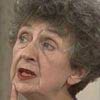 ... ...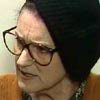 ... ...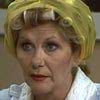 ... ...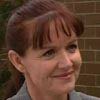
What
if one was to ask which female characters have made the biggest
impact on the day-to-day existence of Ramsay Street and its
residents? It is likely that among the most memorable of all
Neighbours characters, people like Helen Daniels; Madge
Bishop; Mrs Mangel and Dorothy Burke would be quite near the
top of that list. However, would you select Lyn Scully; Rosie
Hoyland or Susan Kennedy for similar status within that list?
Maybe, if their acting talents and the friendly nature of
their characters taken into account, you would. Maybe it might
be classed an unfair comparison. Rosie was only ever in the
show for a year, despite her popularity. However, these women
have, or did, fall victim to the worrying culture within
Neighbours of victimizing, and demeaning the female roles.
Prisoner
was a massive culture shock when it aired. For the first time
a programme was depicting women as being the stronger sex.
Prisoner and Neighbours' Casting Director, Jan
Russ, has said that no other show has come close to doing
so much in favour of women's roles on television as Prisoner
did. Sadly, she is right. Neighbours began with an
excellent mix of strong and weak male and female characters,
but, unfortunately, in recent times that balance has been
lost. In the 1980s, we were presented with Paul and Gail Robinson,
managers of the Erinsborough branch of Lassiter's Hotels.
Gail could be every bit as feisty and scheming as Paul, despite
them both being very caring and likeable people, deep down.
They were truly well-rounded characters. In a similar fashion,
the 1990s saw Lou Carpenter, a seemingly harmless, yet very
determined middle-aged entrepreneur was partnered with Caroline
Gillmer as the wonderful Cheryl Stark. Cheryl had the ability
to wrap Lou around her little finger, and was, for the most
part, the dominant half of their relationship. But, Cheryl
knew, and the viewers knew, that she could not function without
Lou, because he was strong in so many ways that she couldn't
hope to be.
Anne
Charleston has said herself that the whole basis for Madge
came as a result of the Max Ramsay character. As his sister,
Anne always worked on the theory that they were very similar
in terms of opinions, attitude and idea of family loyalty.
Madge's storylines were always written in this way. No matter
how awful or unfair life was, Madge would always support her
family and stand up for what she believed in and never gave
into her oppressors. In the early years of the programme,
Madge fought on many occasions with Mrs. Mangel and Eileen
Clarke. Later on it was Dorothy Burke who caught the bitter
end of Madge's tongue. In short, Madge was not a person you
would particularly want to cross. But, deep down, Madge had
a heart of gold and was a truly kind person, and Anne Charleston
portrayed her fantastically. In 1992, after a storyline that
saw Madge's husband, Harold, washed out to sea, Madge left
Erinsborough to live with Scott and Charlene in Brisbane.
It wasn't until 1996 that Madge returned to Erinsborough and
was reunited with amnesiac, Harold. It would be quite understandable
that a whole new team of writers and storyliners would have
difficulty, at first, scripting dialogue and plots for Madge
after four years. However, the majority of the writers had
written for Madge the first time around, and a story team
capable of plotting dramatic and strong storylines for male
characters could surely do the same for Madge? No, it would
appear not.
Anne
Charleston stated that the style of writing for Madge had
altered since her first stint, but she put this down to the
time lapse. But, it is impossible to excuse the changes made
to Madge with the majority of the story and production crew
being the same as on her original run. Gone, it seemed, was
"strong Madge". The Madge that you didn't dare cross.
The Madge who didn't get easily upset and would rarely let
her emotions show. The "new Madge" was weak, victimized
and a true shadow of her former self. Working alongside Ian
Smith, again, as Harold, the contrast became all the clearer.
In the past, Madge would have been the dominant half of the
relationship - whereas Harold, while maintaining a hidden,
strong element to his character, would always be dictated
by Madge. Anne Charleston maintains that the only reason the
relationship between Harold and Madge worked is because they
were like chalk and cheese. By 1996, however, the contrast
between them was ever fading. Harold was becoming increasingly
dominant in the relationship, and Madge seemed to stay at
a constant half-way point between being "old Madge"
and some new, undetermined Madge.
While
the dialogue alone was proof enough that Madge had been changed,
some of the storylines given to her held greater weight as
evidence of the "dumbing down of Madge". In 1997,
Madge was diagnosed with a brain tumour. The medical implications
meant Madge suffered from several "blackouts" causing
falls and accidents, as well as blindness as a result of the
operations. The blindness, in turn, cause Madge to accidentally
set No. 24 on fire with her trapped inside. It wasn't, fortunately,
until nearly two years later when Madge next suffered. She
was held at knifepoint during an armed raid on The Coffee
Shop; she was burgled; terrorized in her home and workplace
and was confined to a wheelchair for several weeks (granted,
the latter was as a result of a real life injury sustained
by Anne). As well as physical weakness, Madge's character
was severely damaged by these occurrences. The Madge and Harold
roles were reversed, and it was he who comforted her and dictated
her actions. The only opportunities, during her entire second
run on the show, of making enemies with other characters were
thwarted. Soon after she arrived, there was noticeable friction
between her and Marlene Kratz - yet less than a year later,
Marlene had been written out of the programme. Madge joined
the women's basketball team and took an instant dislike to
Hilary and Portia Grant. But, again, these were only guest
characters, and even they resolved their differences with
her.
|
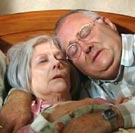
|
During
her time on Neighbours 1996-2001, there was never the
sense of feistiness that Madge had during the 1980s - so much
so that Anne Charleston made reference to how she hated the
"new Madge" in several interviews. Anne sounded
quite optimistic in an interview she gave in the summer of
2000: "I believe they're trying to build up some rivalry
with Lyn Scully which will be good to do". However, for
some reason, the minor misunderstandings the two characters
had never amounted to anything, and this obviously upset Anne
so much, that in the Autumn of 2000, it was revealed she had
handed in her resignation. "I know this is it, now"
she said. Madge was written out of the show having been diagnosed
with cancer. This, in itself, was almost a fitting end to
the "new Madge" of the 1990s. Cancer is a terrible,
weakening and destructive disease, thriving on weakness and
lack of immunity. This was precisely how the writers and story
liners had altered Madge. Even when unwell with the illness,
Madge didn't display the sort of "life goes on"
or "it's happening for a reason" attitude that she
would have a decade previously. Madge died in episodes filmed
at the end of 2000, and episodes that greatly disappointed
Neighbours fans. Of course, it was highly unlikely
that Kylie Minogue or Jason Donovan would reprise their roles
as Charlene and Scott for funeral episodes, so why on earth
show the funeral as having taken place in Erinsborough? It
would seem, quite believably so, that the story team were
adamant that Madge should leave the series in as botched up
a way as she had been written for during the last four years.
No mention, whatsoever, was made of her family or long-time
friends. Not even all the current Ramsay Street residents
were shown at the funeral. This was a disgusting end to one
of soap operas' greatest creations.
That,
is just one example of how the female, matriarchal figure,
in Neighbours has been undermined in recent years.
Maggie Millar, as Rosie Hoyland, has recently been written
out of the show despite the biggest campaign ever seen to
save a character on the show. The producers gave Maggie no
reason for deciding not to renew her contract, and have been
quite hurtful in their manner - not only in the way they wrote
her out so promptly, but also the total disrespect they have
for the wishes of the fans. Maggie's axing is the most recent
example of how strong, female characters are being written
out, or being forced to leave because of the way they're being
written. There is now no central, matriarchal woman in Neighbours.
The closest might be Valda Sheergold, but the character is
so brash and loud, without, it would appear, an ounce of vulnerability,
that she doesn't possess the qualities that have made people
like Helen, Eileen Clarke, Madge and Rosie so popular. It
would seem that this is the avenue the current story team
and Peter Dodds have decided to take. It might be pretentious
of us to suggest this is a weakness, if the format of dumbing
down women's roles in the show was a successful tool in the
Neighbours mix. But, it clearly isn't. Rosie has been
gradually written out in such a way that the character becomes
less and less important in the structure of the show. The
same, watered down exit that Anne Charleston had to endure.
As well as these, more memorable, characters, there are also
many other actresses who have been blessed with the opportunity
to portray strong, determined female roles. Joy Chambers is
fondly remembered as the intermittently appearing Rosemary
Daniels, the director of the Robinson Corporation, based in
New York and in control of the worldwide Lassiter's empire.
Rosemary was one character you could always rely on to provide
a backbone of strength, during one of her obligatory visits
for funerals and family crises. However, Rosemary was only
ever a recurring character, who rarely stayed for visits spanning
any more than a few episodes. Almost in the same mould, recently,
we have the character of Chloe Lambert, the new part-owner
of Lassiter's. Chloe mirrors Rosemary, perhaps she's even
stronger than Rosemary was, but, again, she's only a guest
character, despite the obvious talent Stephanie Daniel has
for playing the role. It would seem that no dominant woman
is allowed to become a full-time character these days.
|
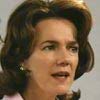
|
But,
I hear you say, why haven't you considered the characters
of Lyn and Susan as strong, female roles? It would give me
no greater pleasure than to consider them as such. However,
Lyn has always been a very self-conscious, vulnerable character.
That's how she was written in, and that's what works for her.
At the time of Lyn's entrance, we had Madge, as the supposedly
"strong woman" in the Street - but as we've seen
already, that role soon diminished. So, what about Susan?
Recent months have seen Susan suffer an embarrassingly scripted
bout of amnesia. For the past eight months, Susan has been
wandering around like a lost dog. In losing her memory, Susan
has also lost any authority, any power and any strength she
had. She's also lost believable vulnerability, and we are
left with a character who is only weak because she has no
facets at all. Perhaps, this might have been more acceptable
if the powers that be hadn't written out other strong women
who could take her place. Even when Susan was at her worst,
the producers ensured Lyn was made to look plainer and frumpier
in terms of clothes and hairstyle. It was almost as if Lyn
can only ever be relative to Susan, and if Susan is suddenly
"sliding down the ladder of strength" then Lyn must
slide ever further, too.
In
2001, there was the wonderful story involving the "Ramsay
Street Book Club" whereby Lyn, Susan and new neighbour,
Maggie Hancock, were given the opportunity to spend time chatting,
reading and advising each other. These scenes made for very
joyful viewing, because it was wonderful to see actresses
Janet Andrewartha, Jackie Woodburne and Sally Cooper interact
on a similar level. When the idea of the "new Hancock
family" was first mooted, fans were very excited by the
prospect that Maggie Hancock, the mother, would be a strong,
level headed woman who would be the strong half of her relationship
with Evan. Yet, Sally Cooper was given awfully mundane material
to work with, and the character never developed. Gone was
a wonderful opportunity to create a truly strong woman who
would be the complete opposite of Lyn, and would share some
characteristics with Susan - thus creating three, very rounded
and well crafted women.
As
we gradually edge nearer the 2003 production block of episodes,
and a new Executive Producer in the form of Riccardo Pellizzeri,
we can hope that the days of making the male the dominant
character a thing of the past. Susan will thankfully be back
to as much as her former self as is possible, but she will
always be tainted with this period of amnesia. Rosie will
be gone, hopefully, not for good. Valda will be there - continuing
the belief that the show cannot provide intelligent, emotional,
yet decidedly strong women for us to enjoy, and Lyn will remain
'Lyn'- a fantastic lady who always aims to be the best, but
somehow, in her mind at least, never quite manages it. Let
us hope that one day, not too far away, Neighbours
will remember what it is to have strong female characters
who can have just as much of an impact, if not more so, than
the males.
Back
|

